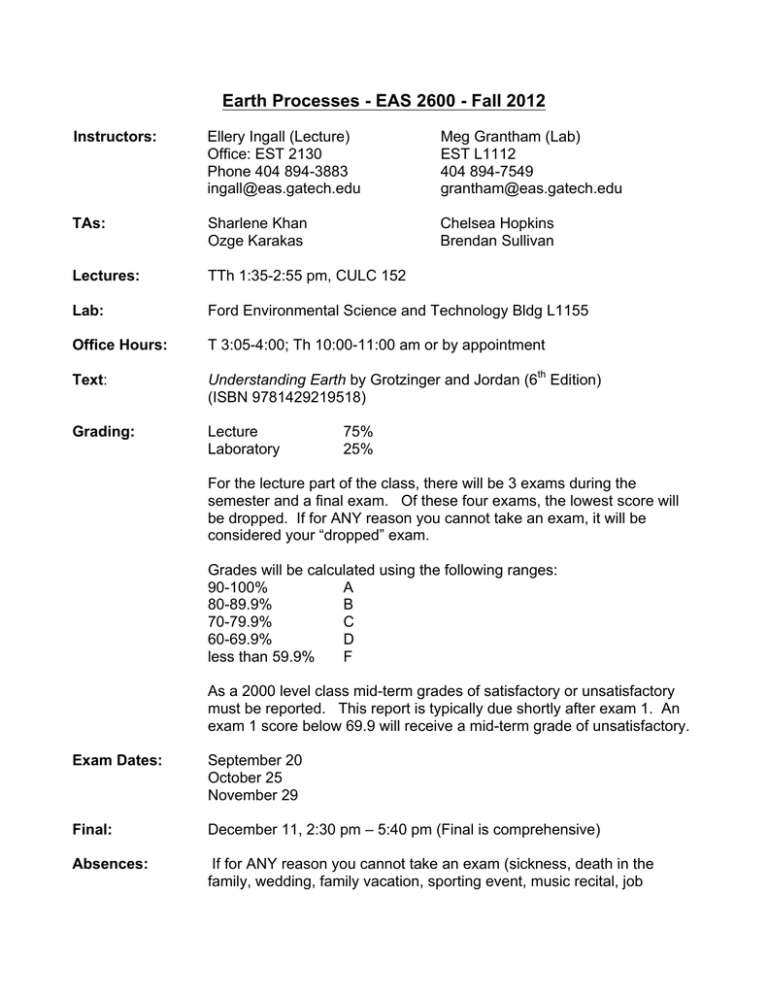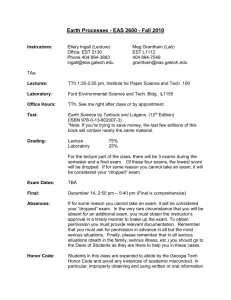Earth Processes - EAS 2600 - Fall 2012
advertisement

Earth Processes - EAS 2600 - Fall 2012 Instructors: Ellery Ingall (Lecture) Office: EST 2130 Phone 404 894-3883 ingall@eas.gatech.edu Meg Grantham (Lab) EST L1112 404 894-7549 grantham@eas.gatech.edu TAs: Sharlene Khan Ozge Karakas Chelsea Hopkins Brendan Sullivan Lectures: TTh 1:35-2:55 pm, CULC 152 Lab: Ford Environmental Science and Technology Bldg L1155 Office Hours: T 3:05-4:00; Th 10:00-11:00 am or by appointment Text: Understanding Earth by Grotzinger and Jordan (6th Edition) (ISBN 9781429219518) Grading: Lecture Laboratory 75% 25% For the lecture part of the class, there will be 3 exams during the semester and a final exam. Of these four exams, the lowest score will be dropped. If for ANY reason you cannot take an exam, it will be considered your “dropped” exam. Grades will be calculated using the following ranges: 90-100% A 80-89.9% B 70-79.9% C 60-69.9% D less than 59.9% F As a 2000 level class mid-term grades of satisfactory or unsatisfactory must be reported. This report is typically due shortly after exam 1. An exam 1 score below 69.9 will receive a mid-term grade of unsatisfactory. Exam Dates: September 20 October 25 November 29 Final: December 11, 2:30 pm – 5:40 pm (Final is comprehensive) Absences: If for ANY reason you cannot take an exam (sickness, death in the family, wedding, family vacation, sporting event, music recital, job interview, arrest, etc.), it will be considered your “dropped” exam. In the very rare circumstance that you will be absent for an additional exam, you must obtain the instructor’s approval at least one week BEFORE the scheduled date to make up the exam. To obtain permission, you must provide relevant documentation. Remember that you must ask for permission in advance in all but unanticipated emergency situations. Finally, please remember that in all emergency situations (death in the family, illness requiring sudden hospitalization, etc.) you should go to the Dean of Students as they are there to help you in these cases. Honor Code: Students in this class are expected to abide by the Georgia Tech Honor Code and avoid any instances of academic misconduct. In particular, improperly obtaining and using written or oral information in the preparation of an exam or lab exercise will not be tolerated. If you are caught cheating on exams or labs you will be turned in to the Dean of Students. The complete text of the Academic Honor Code is found at: http://www.deanofstudents.gatech.edu/Honor/ Sage Advice: This is a basic class in Earth Science. As for any such basic class, you will need to learn the terminology of the field. Thus, doing well on the exams will require memorizing large quantities of information. It is impossible for a typical human being to commit all the necessary material to memory the night before (or, even worse – the morning of) an exam. The human brain just does not work this way. To be successful you will need to pace yourselves and study the material over time. In this class I do not give quizzes as a mechanism to force students to keep up with the material. You are smart students that have the academic credentials to get into a top school like Georgia Tech. Thus, my expectations are high and I leave it to you to self-motivate and keep up with the material. Web Page: Lecture powerpoint slides will be posted on t-square. The posted materials should not be considered complete. I typically show a number of geologically oriented videos, which I cannot post on t-square due to copyright restrictions. Many powerpoint slides are just pictures of various earth features that are only explained and described in lecture. Thus, the posted materials are not a substitute for attending class and reading the text. Old exams will be posted on t-square. Answer keys for some of the written parts of old exams are incomplete but the answers should be very easy for you to look up in your text. Course Topics: I. Forces Within the Earth (Chapters 1-2, 7, 12-14) Earth Structure, Earthquakes Plate Tectonics Volcanoes Mountain Building II. Earth Materials (Chapters 3-6) Earth Composition Minerals Rocks III. Sculpting the Earth’s Surface (Chapters 16-21) Weathering, Landslides Soils Surface and Ground Waters Glaciers, Desert and Wind IV. Earth History (Chapters 8-11) Geologic Time, Radiometric Dating Earth History Summary Geobiology V. Oceans (Chapter 20 plus lectures) Ocean Geology Ocean Chemistry and Life Ocean Circulation and Paleoceanography VI. Atmospheric Processes (Chapters 15, 23 plus lectures) Atmospheric Composition and Structure Air Circulation, Weather Climate and Climate Change


